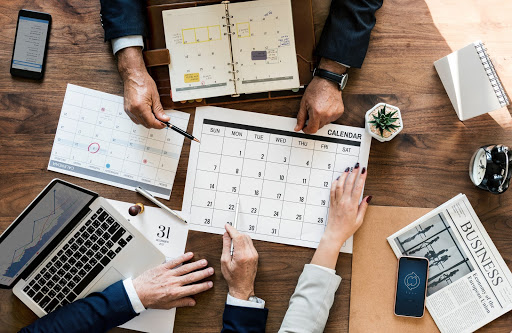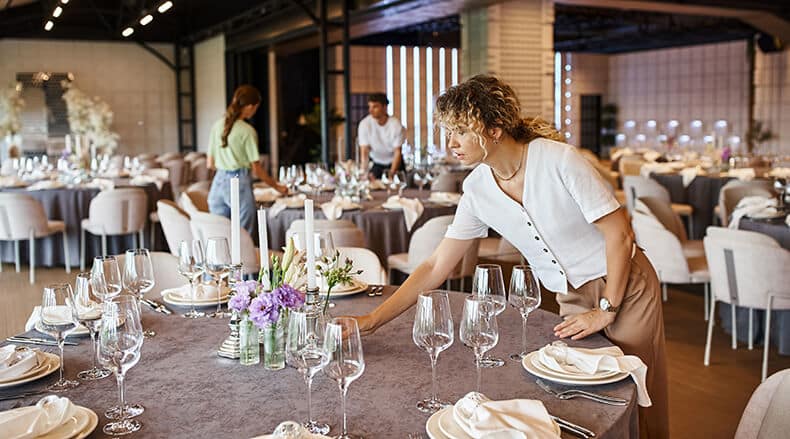Step-by-step guide to hiring event planning companies charlotte nc
Opening the Keys of Successful Event Planning for Memorable Knowledge
Successful event planning requires a critical technique that exceeds plain logistics. It includes a cautious consideration of goals, target market, and styles. Coordinators have to concentrate on creating tailored experiences that involve guests and foster connections. The course to accomplishing remarkable events is often loaded with obstacles. Recognizing the nuances of reliable planning can reveal the possibility for truly impactful gatherings. What are the key elements that make an event memorable?
Defining Your Event Goals and Purposes
Quality is essential when specifying event objectives and purposes, as it sets the foundation for a successful planning procedure. By expressing specific goals, event organizers can develop a clear direction and warranty that all efforts align with the desired outcomes. Goals need to be obtainable and quantifiable, enabling coordinators to track development and evaluate success properly.
Identifying the overarching purpose of the event, whether it is to inform, amuse, or promote, plays a considerable function in forming each choice made throughout the planning phases. Stakeholders need to be included in this preliminary definition phase to collect diverse point of views and cultivate a feeling of possession.

Recognizing Your Target market
Comprehending the target market is necessary for reliable event planning. This involves identifying target demographics and assessing their choices to customize the event experience. By getting insight right into the target market's features and rate of interests, organizers can produce more appropriate and engaging occasions.
Recognizing Target Demographics
Just how can event coordinators assure their celebrations resonate with participants? Determining target demographics is crucial for crafting memorable experiences - event planning companies charlotte nc. Successful organizers start by performing complete research to recognize the age, interests, and choices of their target market. This entails analyzing factors such as geographical area, cultural backgrounds, and socioeconomic condition. By segmenting possible guests right into distinct groups, coordinators can tailor event components, including areas, tasks, and styles, to straighten with details market attributes. Involving with potential attendees via surveys or social networks can give valuable understandings into their assumptions. Ultimately, this targeted approach enables event planners to develop individualized experiences that promote connection and interaction, making sure that gatherings not just fulfill yet surpass the wishes of their audience
Evaluating Audience Preferences
Once target demographics are determined, the following step entails examining target market preferences to create a truly engaging event experience. Comprehending what reverberates with the audience is crucial for customizing material, tasks, and general atmosphere. This procedure can be accomplished with surveys, social networks insights, and past event responses, which provide important data on assumptions, choices, and passions. Event organizers ought to focus on essential aspects such as preferred styles, prospective speakers, and desired networking opportunities. Additionally, maintaining an eye on arising trends can help in preparing for target market requirements. By leveraging this details, planners can design occasions that not only bring in participants but likewise urge active involvement, guaranteeing an unforgettable experience that straightens with target market needs.
Crafting an Unique Motif and Atmosphere
To produce a remarkable event, planners need to first define the event's objective, as this foundational step forms the overall experience. Visual cohesion plays an important function in establishing a style that reverberates with attendees, making each component of the design work harmoniously. Engaging all detects even more enhances the environment, making sure that guests have an immersive experience that remains long after the event wraps up.
Specifying Your Event's Function
While lots of event coordinators concentrate on logistics and visitor checklists, defining the event's objective is crucial for crafting an one-of-a-kind style and environment. Establishing a clear purpose permits organizers to straighten all components of the event, from style to tasks, with a cohesive vision. This clearness assists in picking a motif that reverberates with guests, making sure that the experience is both appealing and memorable. For instance, a company resort might emphasize team effort and advancement, while a wedding celebration may concentrate on love and celebration. By thoughtfully thinking about the event's intent, planners can create an ambience that not just records the essence of the celebration yet likewise fosters purposeful links amongst guests, improving the total experience.
Creating Aesthetic Cohesion
Producing aesthetic communication is important for changing an event right into an unforgettable experience, as it joins different elements under a single, engaging theme. This procedure begins with a clear vision that overviews the option of colors, design, and products. Each component ought to mirror the overarching style, whether it be a business gala or a rustic wedding celebration. Focus to information, such as matching table settings and signage, reinforces this unity. Illumination plays a crucial duty, enhancing the ambience and highlighting vital areas. Furthermore, including consistent branding elements, such as taglines and logo designs, solidifies the theme while creating a professional touch. Inevitably, visual communication not just mesmerizes attendees but likewise promotes a feeling of belonging and interaction throughout the event.
Engaging All Senses
Engaging all detects is important for crafting an unique motif and environment that resonates with participants. Successful event planners acknowledge that including aesthetic, acoustic, olfactory, tactile, and gustatory aspects creates an all natural experience. Thoughtful decor sets the aesthetic tone, while carefully curated songs adds an acoustic layer, enhancing the emotional ambience. Fragrances, whether from flower arrangements or food terminals, stimulate memories and stimulate conversation. Responsive experiences, such as textured materials or interactive installations, invite guests to involve literally with the atmosphere. Ultimately, using distinct food and beverage selections can tantalize preference buds, leaving an enduring impression. By taking into consideration each sense, event coordinators can develop remarkable experiences that deeply link with guests, making certain that the event remains remarkable long after it wraps up.
Handling Logistics and Budgeting
Reliable event planning rests on the cautious administration of logistics and budgeting, as these aspects are fundamental for guaranteeing a seamless experience. An effective event requires meticulous attention to detail in working with transport, place selection, and essential equipment. Coordinators should evaluate the demands of the event and produce a complete list to handle timelines efficiently.
Budgeting plays a significant role in identifying the extent of the event. It involves not only alloting funds for every facet however additionally establishing and anticipating prospective costs apart contingencies. By prioritizing investing, organizers can make informed choices on where to invest, whether in top notch suppliers or special locations.

Involving Visitors Throughout the Event
How can event organizers ensure that visitors stay mesmerized and entailed throughout the period of an occasion? Involving visitors requires a thoughtful mix of interactive components, entertainment, and personal links. Efficient event coordinators integrate activities that motivate engagement, such as online polls, Q&A sessions, or hands-on workshops.
Additionally, developing a dynamic environment with songs, visual displays, or themed decoration can improve the overall experience. Using possibilities for networking and social communication cultivates connections among participants, making them feel a lot more invested in the event.
Furthermore, strategic use of modern technology, like event applications or social media assimilation, more helpful hints can maintain visitors notified and involved. Planning shock aspects, such as guest speakers or entertainment interludes, can also catch focus and maintain excitement. Inevitably, the vital lies in balancing framework with spontaneity, ensuring that guests really feel both involved and captivated throughout the event.
Examining Success and Event Feedback
What methods can event planners use to evaluate the success of their events and gather valuable feedback? Organizers frequently use questionnaires and surveys distributed shortly after the event to capture guests' perceptions. These tools can be tailored to evaluate complete satisfaction degrees concerning different facets, such as location, audio speakers, and general experience.
Furthermore, coordinators may perform meetings or emphasis groups with choose individuals for even more extensive understandings. Social media site monitoring additionally gives a real-time snapshot of guests' beliefs, as visitors frequently share their experiences online.
Analyzing participation numbers and engagement metrics can additionally highlight locations of success and those needing improvement. Finally, assessing the event's objectives versus actual results allows organizers to recognize gaps and successes, informing future events. By utilizing a mix of these methods, event planners can collect comprehensive responses to enhance future celebrations.

Often Asked Concerns
Exactly how Do I Pick the Right Location for My Event?
Selecting the appropriate venue entails evaluating capacity, place, availability, services, and ambiance. Additionally, taking into consideration budget restraints and the event's purpose ensures an ideal atmosphere that fulfills participants' more demands and enhances the general experience.
What Should I Include in an Event Planning Timeline?
An event planning timeline must consist of vital milestones, due dates for supplier bookings, spending plan evaluations, location confirmations, advertising schedules, staffing arrangements, and a list for day-of logistics to guarantee a smooth implementation of the event.
Just How Can I Properly Advertise My Event?
To effectively advertise an event, one ought to make use of social media sites systems, engage neighborhood influencers, produce attractive visuals, use early bird tickets, and keep consistent communication with e-newsletters and targeted promotions to reach a more comprehensive audience.
What Are Some Tips for Managing Final Adjustments?
To take care of final adjustments efficiently, one must maintain clear interaction with all stakeholders, prioritize tasks, stay flexible, and have backup strategies ready (event planning companies charlotte nc). Adaptability and a calm temperament can substantially reduce stress and anxiety throughout unanticipated circumstances
Exactly how Do I Deal With Difficult Visitors Throughout the Event?

To produce a memorable event, planners should first define the event's objective, as this foundational action shapes the overall experience. While many event planners focus on logistics and guest checklists, specifying the event's purpose is important for crafting a special style and environment. Effective event planners identify that incorporating aesthetic, auditory, olfactory, tactile, and gustatory elements produces an all natural experience. their website Exactly how can event planners ensure that visitors remain mesmerized and included throughout the period of an event? Assessing the event's objectives versus real results allows organizers to identify successes and voids, informing future occasions.